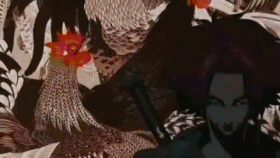| Adult Swim Premiere | May 14, 2005[1] |
| Original Network | Fuji TV |
| Seasons | 1 |
| Episodes | 26 |
Samurai Champloo is a Japanese anime series, developed by Manglobe, that featured a production team led by director Shinichiro Watanabe, character designer Kazuto Nakazawa and mechanical designer Mahiro Maeda. The musical score predominantly features hip hop music produced by Tsutchie, Nujabes, Fat Jon, and Force of Nature. The anime premiered in Japan on Fuji TV from May 20, 2004 to March 19, 2005.
An edited English dub of Samurai Champloo premiered in the United States on Adult Swim from May 14, 2005 to March 8, 2006, with reruns continuing through March 7, 2008. However, the final 6 episodes actually premiered days before they aired on Adult Swim on "Friday Night Fix," an AS online streaming block that premiered on Friday, February 3, 2006.[2] The edits made to the series included foul language replaced with record scratches and cutting out blood and nudity. A less edited version of the English dub later aired on Adult Swim's Toonami programming block from January 2, 2016 to July 9, 2016.[3]
Plot[]
Mugen is a ferocious, animalistic warrior with a fighting style inspired by break-dancing. Jin is a ronin samurai who wanders the countryside alone. They may not be friends, but their paths continually cross. And when ditzy waitress Fuu gets them out of hot water with the local magistrate, they agree to join her search for the samurai who smells like sunflowers.
Setting[]
Samurai Champloo employs a blend of historical Edo period backdrops with modern styles and references. The series relies on factual events of Edo-era Japan, such as: the Shimabara Rebellion, Dutch exclusivity in an era in which an edict restricted Japanese foreign relations, and Ukiyo-e paintings. However, fictionalized versions of real-life Edo personalities like Mariya Enshirou and Minamoto Musashi were also featured. The exact placement within world history is questionable and is likely somewhat distorted by artistic license. For instance, the appearance of a six shooter in the episode of "Misguided Miscreants Part I" suggests that the story takes place after 1814, which is when that style of weapon was first invented, yet in the episode "Stranger Searching" it is explicitly stated that trade relations between Japan and the Dutch East India Company exist, the latter of which went defunct in 1798. Also, the samurai who smells of sunflowers is said to have taken part in the Shimabara Rebellion, which historically occurred between 1637 and 1638. Also incorporated within the series are signature elements of modernity, especially hip hop culture, such as rapping, bandits behaving like "gangstas," censorship bleeps replaced with record scratching, and much of Mugen's character design.
Characters[]
- Mugen: A brash vagabond from the penal colony Ryukyu Islands, Mugen is a 19-year-old wanderer with a wildly unconventional fighting style. Rude, lewd, vulgar, conceited, temperamental and psychotic, he is something of an antihero. He is fond of fighting and has a tendency to pick fights for petty reasons. It is implied in a few episodes that he is also a womanizer, with his libido sometimes getting the better of him. He wears metal-soled geta and carries an exotic sword on his back. In Japanese, the word mugen means "infinite" (literally, "without limit" or "limitless"). He was a former pirate. In the title cards, his totem is the rooster
- Jin: Jin is a 20-year-old reserved rōnin who carries himself in the conventionally stoic manner of a samurai of the Tokugawa era. Using his waist-strung daishō, he fights in the traditional kenjutsu style of a samurai trained in a prominent, sanctioned dojo. He is pursued by several members of his dojo as he had killed their master in self-defense. He wears glasses, an available but uncommon accessory in Edo-era Japan. Spectacles, called "Dutch glass merchandise" ("Oranda gyoku shinajina" in Japanese) at the time, were imported from the Netherlands early in the Tokugawa period and became more widely available as the 17th century progressed. His pair of glasses is purely ornamental, as Mugen later found out after getting a chance to peer through them. Although pictured in advertisements as smoking a kiseru, he was never depicted with one in the series. In the title cards his totem is a koi fish. He is named after one of the seven virtues of the samurai in Bushido, "Jin" (Benevolence).
- Fuu: A spirited 15-year-old girl, Fuu asks Mugen and Jin to help her find a sparsely described man she calls "the samurai who smells of sunflowers". Her father left her and her mother for an unknown reason. Without her father around to support them, Fuu and her mother led a difficult life until her mother died of illness. After a not-so-successful stint as a teahouse waitress/dancer she saves Mugen and Jin from execution and recruits them as her bodyguards. A flying squirrel named "Momo" (short for momonga, "flying squirrel") accompanies her, inhabiting her kimono and frequently leaping out to her rescue. Her name, Fuu, is the character for "wind".
![[adult swim] wiki](https://static.wikia.nocookie.net/adultswim/images/e/e6/Site-logo.png/revision/latest?cb=20230813010904)


